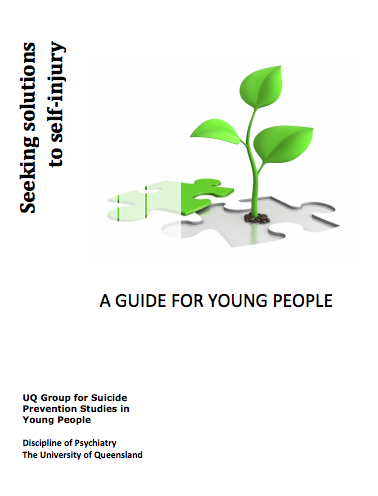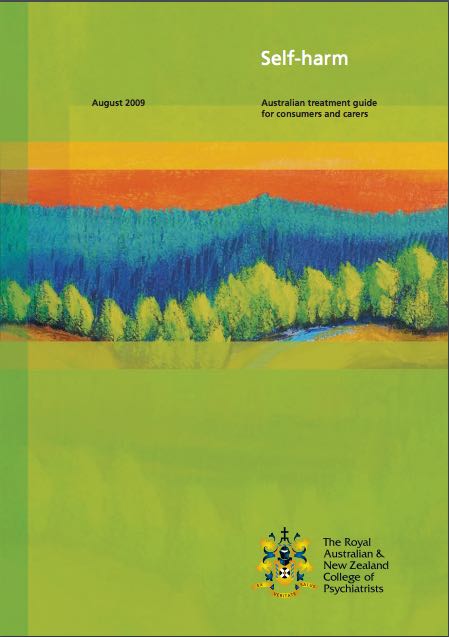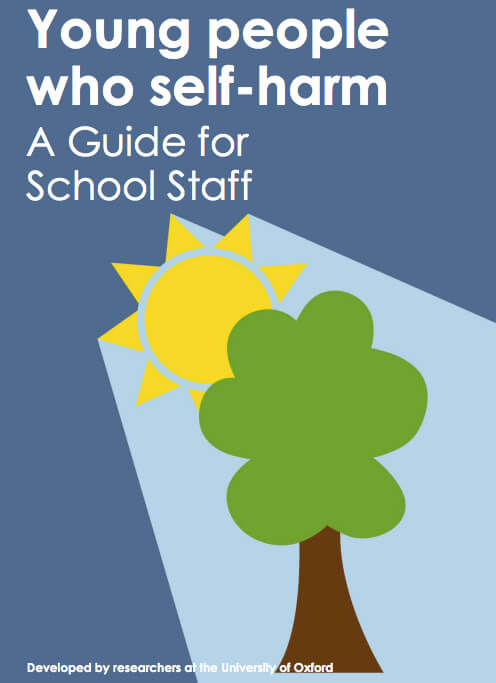You can now add Healthify as a preferred source on Google. Click here to see us when you search Google.
Self-harm
Also known as self-injury
Key points about self-harm
- Self-harm is when you damage or injure your body on purpose.
- It is a way of coping with intense emotions or distress brought on by difficult situations.
- Although it usually provides immediate and short term relief, it has many downsides.
- If you are harming yourself, talk to someone you trust.

- Self-harm is not uncommon, especially in young people.
- If you self-harm you are not weak or crazy or attention seeking. It just means you are overwhelmed by how you are feeling right now and this is a way you have found to cope.
- Some people who self-harm are at risk of suicide but harming yourself doesn't necessarily mean you want to end your life.
- Self-harming can make you feel better in the short term but doesn’t usually help in the long term. This is because, while self-harm takes away the painful feelings, it means you don’t learn other, healthy strategies for dealing with them. You also don’t figure out solutions for the problems causing them in the first place. It can also cause scarring, which many people who self-harm dislike. Fortunately, there are other things you can do that will help you start to feel better both now and in the long term.
- If you are harming yourself, talk to someone you trust. It’s up to you to decide if you’re ready to stop and who you want to talk to. Remember though, it’s a lot easier on yourself if you can find someone you trust to talk things through with. A close whānau member, your doctor or your school counsellor can be good people to talk to.
- If you don’t want to talk to someone in person, you can call a helpline where you can remain completely anonymous, but can talk to someone who understands what you are going through:
- Call or free text 1737
- Call Lifeline on 0800 543 354
- Call Youthline on 0800 376 633, or text 234
- Call Samaritans on 0800 726 666
| If you have seriously injured yourself, taken something poisonous or overdosed on medicine or drugs, call 111 and ask for an ambulance. |
|---|
| If you are trying to stop yourself from hurting yourself right now, you can get help from your local DHB’s mental health crisis assessment team. Find your local service by looking online at Get help in a crisis(external link) or free call or text 1737(external link). |
There are many reasons why someone might self-harm. Most people self-harm as a way of coping with overwhelming emotions. These can include intense sadness, anxiety, anger and shame. Sometimes it’s just to feel something in response to feeling numbed out. These strong feelings or numbness can be triggered by a whole array of stressful life situations from work or study stress to having a fight with someone you love and everything in between. The main thing to remember is that the situation is difficult for the person experiencing it and it produces a strong emotional response.
In most cases talking therapy such as Dialectical Behavioural Therapy (DBT) is recommended for people who self-harm. Talking therapy involves attending sessions with a therapist to talk about your thoughts and feelings, and how these affect your behaviour and wellbeing. You also learn healthier ways of managing difficult thoughts and feelings, and how to cope better with distress.
You can ask your GP to recommend someone or find a counsellor(external link) yourself.
There are also online therapy modules listed below where you can learn different ways of managing difficult thoughts and emotions.
If you have other health problems as well, such as significant anxiety or depression, your treatment plan may involve medicines to treat these.
Getting help for self-harm using the contacts above is really important, but it’s up to you to decide when you’re ready to stop self-harming and who you’d like to help you. In the meantime, here are some small things you can do:
- Learn what your triggers are – what are the situations that are overwhelming you? It could be places, certain behaviours in other people, times of day, etc. Keep a journal to build up a picture over time. This will be helpful when you want to work with someone on stopping self-harm.
- Staying connected to family, whānau and friends can help you feel better. If you are spending a lot of time with people who self-harm, find other people to be with and do things together that you enjoy.
- Learn to recognise the warning signs of how you feel before you experience the urge to self-harm – physical sensations, such as a racing heart, shallow breathing, feeling ill, starting to feel as though you aren’t in your body or strong emotions like anger, or sadness or desperation. Make a note of these in your journal too.
- Think about what sorts of things you can do to distract yourself if you feel the urge to self-harm. Try exercise, music, talking on a helpline, putting ice on your forehead, having a very cold drink, drawing or painting. No matter how strange it may be, if it works for you it’s important. The Calm Harm App has a list of distracting and comforting activities that you can use to ride out the wave of the urge to self-harm.
- Learn slow breathing as this is a great tool to calm yourself when you are distressed. Try the Calm Harm Breathe Activity on the Calm Harm App.
- Write a list of the things that work for you and keep it with you to remind yourself when you notice your warning signs. Some apps, eg, Virtual Hope Box, allow you to create your own reminders for different situations.
- Look after yourself – get enough sleep, eat regularly and get some exercise every day. Cut down on, or stop, taking alcohol and recreational drugs. Neglecting any of these simple things makes you much more vulnerable to overwhelming feelings and the urge to self-harm.
- Find a support group – ask your doctor or counsellor if there is a support group near you for people who self-harm. Or try an online support group, eg, the self-harm group(external link) on the Mental Health Forum or togetherall. (external link)
- Don’t ignore any difficult feelings you have – have a plan for those times. Talk to a counsellor or learn skills for managing emotions on one of the websites listed in the online resources below.
- It’s wise to keep taking any medication your doctor prescribed for you and keep attending all your appointments. If you have concerns about any medicines you are taking it is better to talk to your doctor before stopping them.
See also how to support someone who is self-harming below.
Apps reviewed by Healthify
You may find it useful to look at some Mental health and wellbeing apps.
Video: Talking about self-harm
This video may take a few moments to load.
(NHS, UK, 2018)
Helplines
- Need to talk? Free call or text 1737(external link) any time for support from a trained counsellor
- Lifeline(external link) 0800 543 354 (0800 LIFELINE)
- Depression Helpline(external link) 0800 111 757
- Suicide Crisis Helpline(external link) 0508 828 865 (0508 TAUTOKO) – for people in distress, and people who are worried about someone else
- Samaritans(external link) 0800 726 666
- Youthline(external link) 0800 376 633, free text 234 or email [email protected]
- What's Up(external link) 0800 942 8787 – for 5 to 18-year-olds, phone counselling is available Monday to Sunday, 11am-11pm. Online chat is available Monday to Sunday 11am-10.30pm.
- OUTLine NZ(external link) 0800 688 5463 (0800 OUTLINE) – provides confidential support for sexuality or gender identity issues
Online resources
- Calm Harm app provides activities that help people manage the urge to self-harm in the moment.
- Virtual Hope Box an app that contains simple tools to help people cope with strong, unpleasant emotions.
- PTSD coach provides a range of useful tools for coping with strong emotions including anxiety caused by Post Traumatic Stress Disorder.
- Togetherall(external link) free for Auckland DHB residents. A UK-based professionally facilitated, peer support community of people who are experiencing common mental health problems.
- An online training module from the Australian Centre for Clinical Interventions to help you learn how to tolerate distress better.(external link)
- DBT self-help(external link) modules on managing a range of issues including self-soothing, building self-compassion and facing your feelings.
What are the signs of self-harm?
There are many different ways people intentionally harm themselves, such as:
- cutting or burning their skin
- punching or hitting themselves
- poisoning themselves with tablets or liquids, or similar.
Many people who self-harm will try to keep it a secret. For example, if they're cutting themselves, they may cover up their skin. It's often up to close family and friends to notice when somebody is self-harming, and to approach the subject of self-harm with care and understanding.
If you think someone is self-harming, the following are some signs to look out for:
- unexplained cuts or bruises, or cigarette burns on places such as their wrists, arms, thighs or chest
- keeping themselves fully covered, even when it is hot
- having a low mood, being tearful or lacking motivation or interest in doing anything
- talking about themselves in a negative way and saying they want to punish themselves for something
- becoming withdrawn and not speaking to other people
- blaming themselves for any problems or thinking they're not good enough for something
- not wanting to go on and wishing to end it all
- signs they have been pulling out their hair or eyelashes
- signs of misusing alcohol, drugs or medication.
What can I do if someone tells me they are self-harming?
If someone tells you they are self-harming or they want to hurt themselves, remain calm, thank them for telling you and let them know you are there for them. Ask them if they want to tell you what’s going on for them. Be patient – they might not want to open up straight away but letting them know you are ready to listen is a big help.
Let them know that, when they are ready, you can support them to access professional help, like a doctor or psychologist. Go with them if possible.
If you are worried they might be suicidal, ask them. It could save their life. Asking about suicide will not put the thought in their head.
If the person is feeling suicidal, don’t leave them alone. You could ask someone else to be with them when you need to leave or need time out. It is good to call for help so you don’t need to manage the risk alone. Call 1737 or your local crisis team.(external link)
Read more about suicide prevention.
If someone is seriously hurt or has taken any poisonous substances get help immediately. Call emergency services on 111 and ask for an ambulance or take them to the emergency department at your nearest hospital.
How can I support someone who is self-harming?
If someone in your life is self-harming you can offer support in following ways:
- Be prepared to be there, offer support and stay involved. Keep talking to them and don’t avoid asking about the hard things in their life.
- If they don’t want to talk with you, ask other people you both trust to support them – friends, family or whānau members, youth workers or others.
- If they would like you to, help them to make a plan of different ways they could cope when they feel like hurting themselves, or help them to download an app like Calm Harm.
- Let them make their own decisions about reducing or stopping their self-harm. Try not to judge their behaviour, but try to understand why they are self-harming.
- Encourage and support them to do what they enjoy and connect with others.
- Accept them for who they are and let them know you care.
As a support person, know that you can’t do everything, and you don’t need to deal with this by yourself – remember it’s okay to ask for help. Find someone you can talk to, a friend or family member you trust or a counsellor.
If self-harming behaviours escalate in frequency or intensity, or the person has associated thoughts of wanting to die, call 1737 or your local crisis team.(external link)
Self-harm(external link) KidsHealth, NZ, 2018
Online NZ support to strengthen wellbeing Ignite(external link) , NZ
Small Steps(external link) Whether you’re looking to maintain wellbeing, find relief or get help, Small Steps can support you and your whānau with practical tools, strategies and advice.
Apps
Mental health and wellbeing apps
Resources
Seeking solutions to self-injury: A guide for young people(external link) University of Queensland, Australia
Self-harm: Australian treatment guide for consumers and carers(external link) The Royal Australian & New Zealand College of Psychiatrists, 2009
Young people who self-harm: A guide for school staff(external link) University of Oxford, 2018
References
- Self-harm(external link) NHS, UK, 2015
- The health and wellbeing of NZ secondary school students in 2012(external link) The University of Auckland, NZ, 2013
- Self-harm(external link) Mental Health Foundation, NZ
Clinical practice guideline for the management of deliberate self-harm(external link) Royal Australian and NZ College of Psychiatrists, 2016
Managing frequently encountered mental health problems in young people – non-pharmacological strategies(external link) BPAC, NZ, 2015
How to support a child or teenager with depression Healthify clinician’s page
Quality standard for self-harm(external link) NICE, UK, 2013
Late-life self-harm in the Waikato Region(external link) NZ Medical Journal, 2015
See our page Youth health for healthcare providers
Apps
Brochures

University of Queensland, Australia

The Royal Australian & New Zealand College of Psychiatrists, 2009

University of Oxford, 2018
Credits: Healthify editorial team. Healthify is brought to you by Health Navigator Charitable Trust.
Reviewed by: Kris Garstang, Clinical Psychologist, Life Mind Psychology
Last reviewed:
Page last updated:





